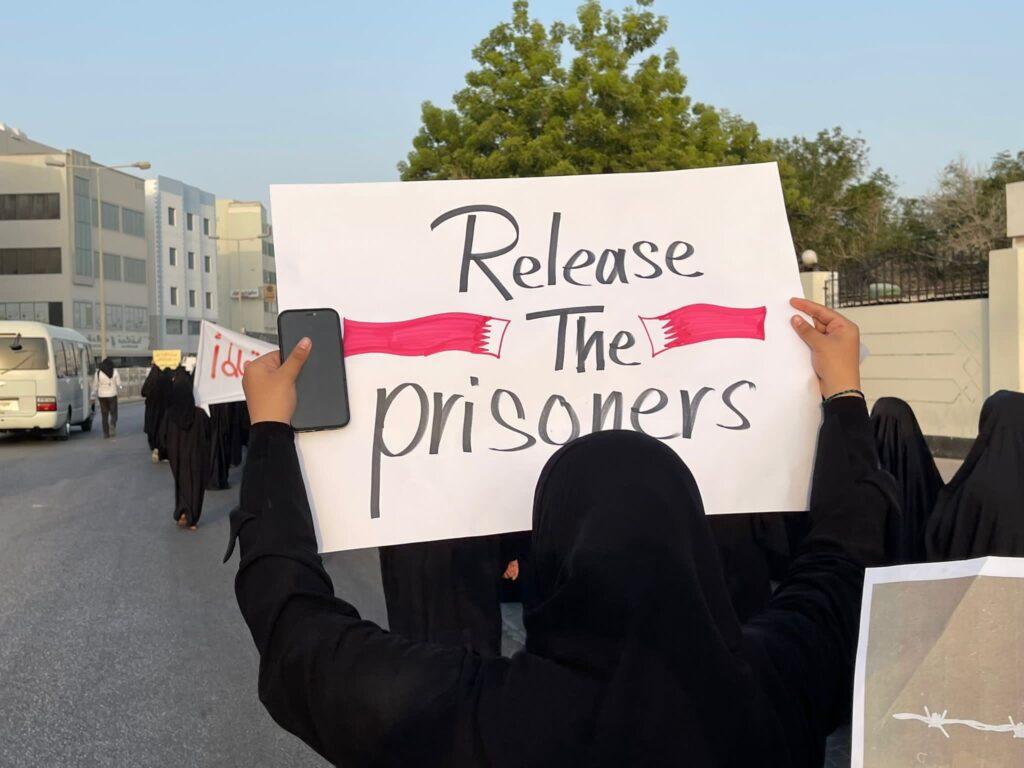A hunger strike of hundreds of inmates in Bahrain’s Jau Prison has entered its third week. The hunger strike began with over 400 prisoners and has now reached at least 743, according to data collected by the Bahrain Institute for Rights and Democracy (BIRD).
Authorities have failed to reach a resolution with prisoners. Their demands include:
-
- End to isolation for prisoners held in Building 3 and others placed in buildings with criminal prisoners in violation of their classification;
- Increased time allowed outside the cell (which is only one hour now) and to allow prayers in congregation at the building mosque;
- Amended visitation rules to relieve constraints like glass barriers and allow family visitors who are not first-degree relatives;
- Provision of proper medical care and access to educationCommenting on the ongoing strike.
Sayed Ahmed Alwadaei, Advocacy Director at the Bahrain Institute for Rights and Democracy (BIRD) stated:
“This is the largest prison hunger strike in the country since Bahrain’s 2011 pro-democracy protests. As prisoners enter their third week, some have begun to collapse and others have been hospitalised. Some inmates are relying solely on water to survive and refusing even IV drips.
Authorities continue to fail to offer prisoners a deal that would improve their conditions and resolve this extremely dangerous and now life-threatening situation.”
The strike has received widespread international media coverage, including from The Guardian, AFP, and AP.
Widespread protests
Friday, 18 August, saw large protests break out across Bahrain where families of political prisoners led demonstrations in solidarity with those on hunger strike. Protestors, including women’s marches, called for the release of political prisoners.
In a show of solidarity with the striking prisoners, exiled Bahraini activists staged a 24-hour hunger strike outside the Bahraini Embassy in London and were joined by Brian Dooley, an internationally recognised human rights advisor.
The protests followed an outpouring of support and solidarity across Bahrain with multiple small-sized Shia villages, including Bani Jamra, Sanabis, and Karzakan, holding protests and chanting slogans in support of the striking inmates and calling for their release. They further escalated after 10 leading political activists, 7 of whom were convicted after the 2011 pro-democracy protests, including Abdulwahab Hussain, refused to take their meals, in solidarity with the prisoners on 16 August.
International response
In a press briefing on Thursday, 17 August the US State Department stated they are “aware of and concerned of the reports of this hunger strike at the Jaw Rehabilitation and Reform Centre.”
On August 18, 15 NGOs wrote to UK Foreign Secretary James Cleverly, calling on him to urge his Bahraini counterparts to unconditionally release all those sentenced for their political beliefs on abusive charges or after unfair trials, including human rights defenders Abdulhadi Al-Khawaja and Abduljalil Al-Singace, and in the interim, to ensure all prisoners’ immediate access to medical care and humane prison conditions.
A group of NGOs also wrote to the US government raising concerns about Mr Abdulhadi Al-Khawaja, citing an independent doctor who warned that Mr Al-Khawaja “may not survive for more than a few days given his deteriorating condition, chronic health issues, and the potential for sudden, fatal cardiac arrest.”
Further Developments
Striking prisoners have faced reprisals, including Ahmed Jaafar, who undertook a further protest in the prisoner yard and was pepper-sprayed, shackled, and placed in solitary confinement with shackles, where he remains as of Monday, 21 August.
On 12 August, the Ombudsman (Interior Ministry oversight body) issued a highly misleading statement which legitimises degrading policies within Jau Prison and fails to address the concerns raised by the striking inmates. The Ombudsman receives UK taxpayer-funded support through the Gulf Strategy Fund, which was doubled to Bahrain in 2022.
-
- Read BIRD’s rebuttal to the Ombudsman’s statement here.




